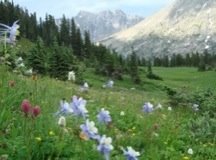I'm not teaching any more in a school setting, but I do continue to work with a Boy Scout troop with the kids from my old public school. Scouting is a kind of schooling, with the curriculum being the material and skills that the boys need to master to advance in rank. I was in Boy Scouts, and in later years I have appreciated the skills I learned there -- skills I do not know if I would have learned anywhere else. These gamut of skills range from physical fitness to woodcraft to nature study to campcraft to citizenship.
While at my old school, situated in an all-too-common high-need low-wealth urban neighborhood, I came to feel that the students lacked, for the most part, the opportunity to experience nature, to interact with the world in tangible, tactile ways. I felt it was a classic case of the problem that Richard Louv captured with his framing of "nature deficit disorder". This absence of opportunity to interact with nature has a psychological cost, as Louv and others have described. There's a field of ecopsychology that addresses it. It also (or maybe just another dimension of the psychological cost) hampers kids in school -- science is a great abstraction without any physical, tactile, visual, aural, etc. experience of the world. This is much of what is lost in the replacement of outdoor play with video games and television. Trying to address that absence of connection with the woods was a big part of why I started working with the troop.
My big project for the coming year (that being 2013) is to work with a crew of scouts to go on the Manistee Quest, a five-day backpacking trip through the Manistee National Forest in western Michigan. The biggest challenge right now is getting together the lightweight gear for backpacking. (There are lots of reasons for this approach -- I defer to Wikipedia for details and rationale.) Most of what the area troops have right now is heavy, car-camping suitable equipment. And no backpacks.
To raise the money for the equipment we will need, I am experimenting with crowdfunding. I have set up a project on GoFundMe. There's also a button on the sidebar to the right. I am still fleshing out the project page -- I need to add some pictures and then connect it to my Facebook account, but you can see a more complete description of the project there. The equipment we get will stay with the Western Trails District (basically all of the Boy Scout troops on the westside of Chicago), so it is an investment in not just the scouts that will go on the quest this year, but in future years as well.
I will post updates here.
jd
Saturday, December 29, 2012
Monday, August 13, 2012
The ideology of word problems
I'm reading Vasily Grossman's A Writer at War: A Soviet Journalist with the Red Army 1941-1945, an assemblage of Grossman's wartime journalism. The writing is fascinating and amazing, but translator/editor Antony Beevor is generally peevish and wont to toss in generous heaps of bullshit in his commentary.
But never mind peevish Beevor -- in the middle of the book, in early 1943, Grossman is assigned to the Kalmyk steppes, recently vacated by the retreating German army. He reports on what life was like in the city of Elista under the Nazis. Grossman includes an interview with a school teacher who continued to teach through the occupation. The teacher describes the changes the Nazis made to the curriculum, and includes this great tidbit:
jd
But never mind peevish Beevor -- in the middle of the book, in early 1943, Grossman is assigned to the Kalmyk steppes, recently vacated by the retreating German army. He reports on what life was like in the city of Elista under the Nazis. Grossman includes an interview with a school teacher who continued to teach through the occupation. The teacher describes the changes the Nazis made to the curriculum, and includes this great tidbit:
Maths: they removed from the textbook all the questions to do with Soviet affairs [and replaced them with]: this number of Soviet aircraft has been shot down, etc. (p. 207)and a few pages later:
At the school, teacher Klara Fransevna set first-year pupils the problem: 'Two Messerschmitts have shot down eight Red fighters and twelve bombers, and an anti-aircraft gun shot down eleven Bolshevik attack aircraft. What is the total of Red aircraft shot down?' (p. 210)An extreme example, to be sure, but I believe Eric Gutstein made the point that teaching math is also ideological, in his Reading and Writing the World with Mathematics?
jd
Subscribe to:
Posts (Atom)





